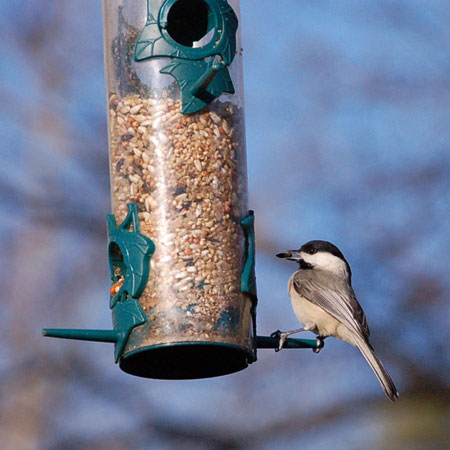Study: It's OK to Feed Birds

Leaving out bird seed in the cold winter months can benefit the adults and their young come breeding season, a new study finds, though ornithologists are divided on the big picture when it comes to feeding our feathered friends.
The backyards and gardens of many houses feature perches or feeders with a ready supply of seeds or other snacks for birds to feed on. Households in the United States and the United Kingdom put out over 1 billion pounds (500 million kilograms) of food, including seeds, bread and even peanuts, for backyard birds each year.
While it was known that feeding birds helps them to survive the winter, the new study, detailed in the Feb. 6 issue of the journal Biology Letters, showed that putting out a little extra food can help the birds' reproductive fortunes.
Breeding boost
A team of researchers from the University of Exeter and Queen's University Belfast gave some groups of garden birds extra food in nest boxes, while leaving another group to fend for itself.
The birds given more to snack on in the winter months laid eggs earlier than the birds in the other group, and they had an average of one more nestling that flew away from the nest successfully.
"These results demonstrate that feeding birds in gardens over winter can be vital to their breeding success," said study team member Dan Chamberlain of the British Trust for Ornithology.
Get the world’s most fascinating discoveries delivered straight to your inbox.
Whether the extra food is adding nutritional value to the birds' diets or simply giving them an extra burst of energy is not known, but study member Stuart Bearhop of the University of Exeter says the researchers are looking to see what sources of food benefit eggs and chicks the most.
Despite studies like this that show some benefit to feeding birds, there is still debate among ornithologists as to whether providing wild birds with an artificial source of food is a good idea at all.
To feed or not to feed?
Some researchers worry that birds might become too dependent on food provided by humans. Bearhop and others call this problem an "ecological trap," because birds become reliant on a food source that is actually unreliable — if people stop putting out bird seeds, the birds might suffer.
Feeding birds can also mess up the timing of breeding because birds use cues that tell them what resources, such as food, are available to figure out when they should lay eggs. In particular, breeding is usually timed so that nestlings will be chirping for their supper when insects are most available in springtime.
In studies of the Florida scrubjay, whose nestlings eat only insects, Reed Bowman of the of the Archbold Biological Station in Florida found that birds who had access to feeders tended to breed earlier in the year, before insects were in abundance.
Babies, potato chips and beer
For species such as the scrubjay, eating food provided by humans seems to mean that more nestlings die and those that do leave the nest are less fit because there's no steady food supply for the baby birds.
"All that human food is not appropriate for nestlings," Bowman said, who likened the situation to human babies having specific dietary needs. "We don't feed babies potato chips and beer."
For birds whose chicks can eat seeds, such as cardinals, earlier breeding might not have the same problems.
Having a ready supply of food could also change bird behaviors, as many have evolved to defend sources of food. Year-round food supplies might also change how birds migrate, keeping them at a more northerly latitude than they would typically stay at.
"There's lots of dynamics that can be altered," Bowman said.
Because all of these factors have different effects on different species, they could favor some species over others, changing their abundances and having cascading effects in the rest of the ecosystem.
Though there seem to be some negative implications for some birds, "we have not drawn the conclusion that feeding birds is wrong," Bowman told LiveScience.
Bearhop agrees: "I will certainly be putting out food for garden birds for the rest of the winter."
Editor's Note: The Royal Society for the Protection of Birds offers tips on how to feed birds responsibly.
- Video: Extraordinary Birds
- Images: Rare and Exotic Birds
- Amazing Animal Abilities

Andrea Thompson is an associate editor at Scientific American, where she covers sustainability, energy and the environment. Prior to that, she was a senior writer covering climate science at Climate Central and a reporter and editor at Live Science, where she primarily covered Earth science and the environment. She holds a graduate degree in science health and environmental reporting from New York University, as well as a bachelor of science and and masters of science in atmospheric chemistry from the Georgia Institute of Technology.


